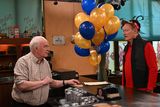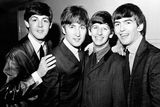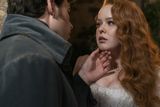When Ronan Keating sang ‘don’t fighd-it’, I obeyed: culture writers reveal their guilty pleasures
Our critics set aside their highbrow inclinations and admit which uncool songs, movies, TV shows and books they just can’t resist


The idea of calling something a ‘guilty pleasure’ has fallen out of favour of late. If you enjoy something, why feel ashamed? Besides, plenty of cultural icons who would have once been seen as irrevocably naff are now considered cool — witness Rick Astley on the main stage at last year’s Electric Picnic, for one.
But for cultural critics who take professional pride in their impeccable taste, there are some things they would be very slow to admit they enjoy. We asked them to do it anyway: name the song they can’t help singing when it comes on the car radio (but make sure the windows are up first); the film they wouldn’t watch without closing the curtains; the book where they’d rip off the covers before taking it on public transport. Here are the results.
Married at First Sight
Lauren Murphy
Whenever I tell friends that I’ve been watching Married at First Sight, I feel a desperate urge to add a caveat. “But it’s great switch-your-brain-off telly,” I reason. “No, really — it’s actually very entertaining.” The cultural snob within me knows that I probably should be watching a subtitled foreign film or reading a book after a hard day’s chin-stroking — but still, I can’t seem to drag myself away.
The premise of two strangers meeting for the first time at the altar is undeniably intriguing from a ‘social experiment’ standpoint, and the often explosive fallout when the pairing goes awry is better than any cheesy soap. It is, to quote Father Ted, chewing gum for the eyes.
Once I’d let slip that I had fallen into the MAFS hole, it was like joining a secret society. “Try the Australian one,” one friend urged. “It’s even better.” They weren’t lying: the recent 11th season of MAFS Australia had one of the most repulsive grooms in the show’s history, a woman who interrupted her new husband to channel messages from the dead and a bride’s dad urging his new son-in-law to have a ‘one-night stand’ with his daughter.
Thirty-eight episodes later, having devoted well over a day of my life to these strangers and their sham relationships, my brain felt polluted. When does the next series start?
Life is a Rollercoaster
(and other Gregg Alexander hits)
Hilary White
Gregg Alexander is the songwriter of gooey, happy-sad, blithely earnest pop hits such as Ronan Keating’s Life is a Rollercoaster and Lost Stars (the anthem from 2013 film Begin Again).
When Keating sang “don’t fighd-it, fighd-it, fighd-it”, I obeyed. Friends eventually stopped giggling and learned to live with my tastes. Or they didn’t.
Before becoming a Grammy-winning songwriter for everyone from Texas to Sophie Ellis-Bextor, Alexander was frontman of New Radicals, a short-lived US outfit who sought to cut a right-on swathe through the charts with their brattish 1998 hit You Get What You Give.
Mother We Just Can’t Get Enough is the opener from sole LP Maybe You’ve Been Brainwashed Too, and is another nugget of kryptonite that I can’t shake. To many, his vocal is a faux-Jagger yawl, coldly crafted like everything Alexander does. To the teen clinging inside me, it’s a holler for a generation to free itself from the consumer classes.
It and the aforementioned tracks skirt a delicate line between face-scrunchingly naff and ingeniously hooky and shrewd. I listen privately with a lopsided smile, like that statue of Oscar Wilde in Merrion Square, drinking the sweet nectar of their cynical pop formula while feeling a little icky. And then I drink again.
Bones
Róisín Lanigan
I know that police procedurals are narratively derivative and ethically dubious. But that hasn’t dampened my love affair with Bones, the TV series that I’m convinced nobody but me has ever watched.
Starring Emily Deschanel (Zooey’s sister) and David Boreanaz (Angel out of Buffy), the show ran for 12 whole years, with 245 episodes over 12 seasons. I bet you haven’t seen a single one.
Here’s the gist: Emily is Temperance Brennan, an extremely rational forensic anthropologist working at the fictional Jeffersonian Institute in DC. She spends her days in the lab poring over skeletons from, like, the Mesopotamian era, or something. Or she does, that is, until she meets Seeley Booth (Boreanaz), a salt of the earth, good Catholic boy, FBI agent and Iraq War vet. Together they solve crimes! And drip-feed the audience sexual tension!
A will-they-won’t-they cop show with gross corpses is low-hanging cultural fruit, I know, but I find it all very soothing; the guns, the formaldehyde, the embrace when one of them saves the other from a serial killer... Because all the crimes are either incredibly specific or committed in the distant past, the stakes are relatively low, and it’s a surprisingly easy, non-threatening comfort watch. This perhaps explains why I have binge-watched the show so many times since it first aired in 2005. To this day, if I’m going through a break-up, a stressful time at work or I’m just feeling miserable, my friends know it’s bad when Temperance Brennan comes back on screen: “Oh no, she’s watching Bones again.”
‘I was staring at a strange creature through the bars of its cage’: Martina Devlin on reading Spare by Prince Harry
Spare by Prince Harry
Martina Devlin
I devoured Prince Harry’s memoir Spare as soon as I could lay my hands on it — driven by nothing but voyeurism. I’d read the newspaper articles that helpfully gutted the book for its juicier details, but edited highlights weren’t enough. I felt a horrible compulsion to wade through it all for myself.
Afterwards, I pondered what drew me to a story I knew already. Then realisation dawned. The two sections I’d lingered over concerned his mother, Diana. Specifically, her death.
Harry writes about visiting Paris for the first time, aged 23, for a rugby match. On the first night, he asked his driver, an Irishman, to take him to the Pont de l’Alma tunnel, scene of the 1997 accident. They drove through it twice.
Elsewhere, he tells how he had asked his press secretary for a confidential police file on Diana’s death (he always refers to her as ‘Mummy’, a reminder he lost her a few weeks before his 13th birthday). A folder was produced and he stared at photographs taken while she lay dying in the back of the crashed Mercedes.
Harry was puzzled by golden spots around her figure. All at once, he understood they were caused by camera flashes — he was looking at seized paparazzi images. Photographers kept snapping Diana while her life ebbed away.
Harry’s rage at tabloid intrusion is justifiable: during his childhood, he witnessed his mother in tears as they were chased by paparazzi; as an adult, he successfully sued newspapers for hacking his phone.
But I wasn’t reading the book to understand his complicated life. I was staring at a strange creature through the bars of its cage. I still feel grubby about it.
Read more
Soft rock classics
John Meagher
Soft rock, especially the early 1980s variant that emerged from the US, has long been despised by critics who deem what music is essential, important, cool. It’s a genre that tends to be dismissed as shallow and superficial, mass market fare majoring on base emotion. Even the videos from the era are seen as irredeemably naff — slow-mo tracking shots, dry ice… you get the drift.
And, yet, I return to it time and again. Foreigner, mid-1980s era the Cars, Phil Collins. I see soft rock almost as a palate cleanser when I step off the reviewing treadmill and when I want a break from my go-to loves such as Bowie, REM, the Smiths, Kate Bush.
Some regard Foreigner’s I Want to Know What Love Is as fatuous pop, but this 1984 global number one is nothing of the sort. It’s almost religious in its fervour, as Lou Gramm sings Mick Jones’ unashamedly emotive lyrics as though his life depends on it. Incidentally, Gramm himself came to loathe the song, feeling that it tarnished Foreigner’s rock credentials.
Forty years on, though, it endures — as do the Car’s Drive and Phil Collins’ Against All Odds. Soft rock anthems all, but built to last.
American Psycho
Tanya Sweeney
To talk about ‘guilty pleasures’ is tricky: I am unabashed in my love of things that others might deem uncool (Tipping Point, power ballads, Three Men and a Baby), but feel guilty about liking things that, when turned to the light, show up as a bit gross.
American Psycho is one of those things. Every so often, a newspaper headline (rightly) asks: would this 1991 novel get published today? Even Bret Easton Ellis doesn’t believe so. “I wouldn’t have the impulse to write that book again,” he told the Guardian.
And yet, when I read it as a 17-year-old, my febrile mind was blown sideways. For the unfamiliar, the novel focuses on Patrick Bateman, a stockbroker and serial killer who wreaks havoc around New York City behind the back of his girlfriend Evelyn and mistress Courtney. By day, he sits around with colleagues appraising mineral water (Evian, memorably, is “too sweet”), comparing business cards, adoring Phil Collins and undertaking a nine-step skincare regime. By night... well. It’s unprintable in these pages.
It was the first time I’d read a novel that was that audacious, graphic, violent and confronting — by then, I was still on a steady diet of Leaving Cert stuff. I had a physical reaction to American Psycho’s sex and murder scenes, and that too was a first.
Many years later, the misogyny, homophobia and scenes involving sex workers have aged like milk. Although I picked the book up a while ago and enjoyed the Wall Street satire even more the second time around, I feel a sort of discomfort that my former self enjoyed the rest of it so much.
I still regard Bateman, the oft-cancelled Ellis and the shock threaded into American Psycho with a strange sort of affection.
Die Hard
Paul Whitington
If anyone asks me what’s my favourite film, I usually pick Rules of the Game, or Tokyo Story, or something by Bergman maybe. And it’s true, those are my favourite films, but my wife has a sneaking suspicion the real answer might be Die Hard.
It’s not a great movie, not by any stretch of the imagination — a silly action romp in which German terrorists who look like members of Duran Duran infest the upper floors of an LA skyscraper demanding money with menaces, their plans thwarted by John McClane (Bruce Willis), a snarky New York cop who takes to the lift shaft and proceeds to make a nuisance of himself.
It’s not subtle, and not so politically correct either: while one of the Germans hums Beethoven’s Ode to Joy, others battle the temptation to unleash a Nazi salute. And McClane’s wife Holly (Bonnie Bedelia) is possibly getting punished by the 1980s paternalist gods for being a go-ahead businesswoman who’s more successful than her deadbeat spouse. But none of that matters because Die Hard is irresistible, especially at Christmas time.
It’s dumb but knows it — even seems to revel in this fact. Any time I come across it I have to watch, for long enough at any rate to hear the great Alan Rickman mutter those immortal words: “Ho. Ho. Ho.”
The Klaxons
Aoife Barry
The Klaxons were one of those mid-Noughties British bands that to me, a fiercely proud music snob, it felt cool to hate. They were part of the very short-lived ‘new rave’ genre, though they were more like a post-punk band with a new laptop and a fondness for glo-sticks. There was something very annoying about how messy they seemed, even during a pretty messy moment in music.
Yet I fell for the single Golden Skans, and furtively listened to their album Myths of the Near Future on repeat in 2007, knowing that there were solid reasons why fellow music snobs pooh-poohed the band. (Just listen to the track Atlantis to Interzone, an aural thumbs down.)
Seventeen years (cripes) since Golden Skans’ release, it still remains one of those tracks that can transport me back to an era when the future seemed big and exciting, and when arguing over new bands was an important weekend activity. Though it’s certainly not the worst guilty pleasure out there, part of me still feels it embarrassing to love a flash-in-the-pan single this much. Or maybe it’s the musical snobbery I should actually feel most guilty about.
Neil Diamond
Pat Stacey
One of the better things about growing older is that you no longer have to give a toss about what people think of your tastes in anything, especially music. It’s different when you’re young, though.
I was born in the early 1960s and navigated my teenage years in the 1970s. My soundtrack was the Beatles, whose songs were a part of my life from childhood, Bowie (I think Life on Mars? was the first single I bought and paid for), Bruce’s magnificent album Born to Run and, later in the decade, during the electrifying new wave period that followed punk, Talking Heads, Elvis Costello and the Attractions, The Jam, Blondie, Squeeze, Graham Parker, Joe Jackson and Nick Lowe.
At that time it would have been credibility-destroying to admit that I had a sneaking liking for some of the songs of… Neil Diamond. Now, of course, we know Diamond, who honed his craft in the Brill Building, is one of the greats.
But it wouldn’t have done any good to remind people that he wrote I’m a Believer for The Monkees, or that I Am . . . I Said is a terrific song, or that Hot August Night is one of the greatest live albums ever made. Even the otherwise ear-numbingly boring UB40 knew how good Diamond was when they covered Red Red Wine.
No, he was just the bloke with the big hair and the spangly shirts who sang Sweet Caroline — one song I’ll never make peace with. Play that at a wedding and the floor is instantly flooded with women “touching hands, reaching out, touching me, touching you”.
My wife and I went to see Diamond in Dublin in the 1990s, and he was superb. As for waving along to Sweet Caroline? Well, sometimes resistance is futile.
Join the Irish Independent WhatsApp channel
Stay up to date with all the latest news











